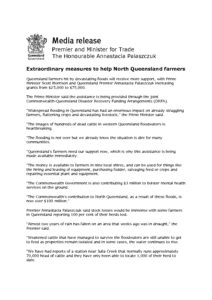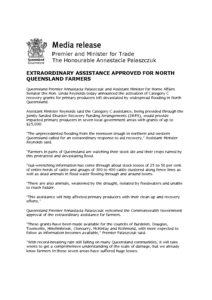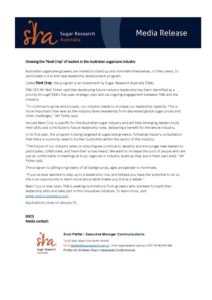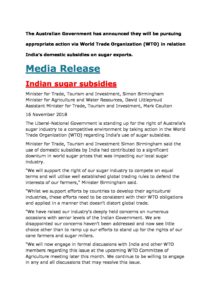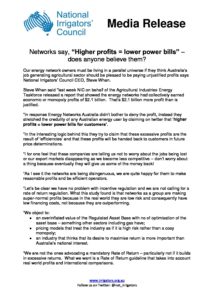Category: Media Releases
Media
Media Release – Assistance Approved for North Queensland Farmers
QFF Welcomes Banking Royal Commission Recommendations
QFF welcomes Banking Royal Commission recommendations
The Queensland Farmers’ Federation (QFF) has welcomed the Australian Government’s commitment to establish a National Farm Debt Mediation Scheme following recommendations made by the Banking Royal Commission released yesterday.
The government has also agreed to recommendations made by Royal Commissioner Justice Kenneth Hayne to have ‘specialised’ agricultural bankers manage distressed farm loans, prevent banks charging default interest during drought or natural disasters and only appoint receivers as a remedy of last resort.
QFF President Stuart Armitage said the government’s commitment to act on the recommendations made by the Royal Commission was a positive step in improving financial services for Queensland farmers.
“Following continued advocacy by QFF, the Queensland Government legislated to create a state Farm Debt Mediation Scheme, recognising the unequal playing field for farmers when negotiating with the big banks,” Mr Armitage said.
“Prior to this, QFF facilitated a voluntary debt mediation system – the Queensland Farm Finance Strategy – on a pro bono basis for 20 years. Legislating and properly resourcing a state arrangement was the logical step towards nationally consistent farm debt monitoring and mediation processes.”
“Bankers move around and modern farming businesses operate across state borders, so a nationally consistent approach to this issue that takes the best elements from each jurisdiction is likely to see a greater chance of fair and equitable outcomes being reached.”
“The requirement that banks not charge default interest on agricultural loans where a national disaster has been declared is timely as many farmers are dealing with drought across 58 per cent of the state and flooding rains in the north.”
In addition, the Australian Financial Complaints Authority (ACFA) will now allow aggrieved farmers seek redress from the banks for incidents stretching back to 1 January 2008. Normally the right to seek redress would end after six years.
“Farmers have 12 months to lodge complaints seeking justice for incidents which occurred between 2008 and 2012. The maximum compensation farmers are able to be seek through ACFA is $2 million,” Mr Armitage said.
QFF – Media Release – Reef Alliance Project
QFF – Media Release – Queensland Farmers Federation
Reef Alliance project delivers reef-wide results
Queensland farmers have continued to embrace practice change and make on-farm improvements to reduce and manage agriculture’s impact on the Great Barrier Reef through the Reef Alliance’s Growing a Great Barrier Reef project.
While farmers have often been viewed by some as scapegoats for the Reef’s problems, they have been proactively working to minimise soil loss, fertiliser application and pesticide runoff from farms to safeguard the future of the Reef.
With year two of the project now complete, the Reef Alliance has released its 2018 Impact Statement detailing the work done to advance on-farm understanding and fast track the implementation of innovative practices.
Queensland Farmers’ Federation (QFF) CEO Travis Tobin said the second year of the project focused on improving the quality of water entering Great Barrier Reef and achieved real results.
“In the International Year of the Reef, more than 40 dedicated extension officers engaged with 1,332 landholders to deliver over 18,430 hours of one-on-one customised farm planning and personalised technical advice,” Mr Tobin said.
“As a result, 206,570 hectares of farmland throughout Queensland’s Reef catchments have demonstrated practice change to safeguard the future of the Reef.”
“While the continued implementation of a single database to manage practice change and extension information across five Reef catchments allows the Alliance to chart a ‘reef-wide story’.”
“Farmers excelling in their roles as environmental stewards, extension officers and community members that contribute to better water quality outcomes were recently recognised by the 2018 Reef Champion Awards.”
“Innovative nitrogen reduction practices, dedicated approaches to extension, revegetation of farms and conservation of wetlands and riparian areas are just some of the success stories of the agricultural sector working to protect the Reef.”
“These important actions are making huge improvements to the quality of the water leaving the farm and significantly contributing to the health of the Great Barrier Reef.”
MEDIA RELEASE – Sugar Code of Conduct Stays
Media Release – The Hon. David Littleproud MP
Sugar Code of Conduct Stays
Minister for Agriculture and Water Resources, David Littleproud
Member for Dawson, George Christensen
Member for Capricornia, Michelle Landry
Member for Flynn, Ken O’Dowd
________________________________________
12 December 2018
• The government has released response to review of the Sugar Code of Conduct.
• The code will be retained to provide certainty for the sugar industry.
• The review included 60 written submissions, in addition to face-to-face meetings.
The Sugar Code of Conduct will be extended a further four years to provide certainty for the Australian sugar industry.
Minister for Agriculture David Littleproud today joined Member for Dawson George Christensen to make the announcement following the extensive review, which included sixty written submissions.
“The code came about to give sugar cane growers, millers and marketers certainty to just get on with the job and I’m happy to say it’s here to stay,” Mr Christensen said.
“Queensland is the powerhouse of the Australian sugar industry and produces 95 per cent of all sugar. If the sugar industry is strong Queensland is strong.
“I want to thank the Queensland LNP for their assistance in protecting the interests of cane growers.”
Minister Littleproud said the government held public consultations across key sugar growing regions in Queensland and Northern NSW.
Minister Littleproud said he brought forward the review, which was due to commence in October 2018, to July this year following the industry’s requests for certainty.
“This now provides certainty,” Mr Littleproud said.
“Public consultations were held in Gordonvale, Innisfail, Ingham, Ayr, Mackay, Bundaberg and Broadwater and with key stakeholders to make sure a range of views were heard.
“I acknowledge the sugar industry’s recent efforts in improving cooperation. I look forward to industry continuing to work together on the recommendation to develop a strategy to address the shared future challenges facing the industry.”
Member for Capricornia Michelle Landry welcomed the move to keep the code in place.
“This will be welcome news in Mackay, where 47 percent of the region is devoted to growing sugar cane, contributing over $460 million to the economy,” Ms Landry said.
Member for Flynn Ken O’Dowd said this was welcome news for one of the key pillars of agriculture across rural and regional Queensland.
“Australia is the third largest sugar exporter in the world and we must remain strong and viable,” Mr O’Dowd said.
Fast Facts:
• The review included sixty written submissions and face to face meetings with key stakeholders.
• The code sets out a strict process for pre-contract arbitration when growers, millers or marketers fail to agree to terms of contracts or agreements with each other.
• The code will be amended to make it clear that pre-contractual arbitration only applies to raw sugar and not to any other products from sugar cane.
• This code is secure and any changes to it in the future will be subject to a disallowance process. Any attempts to repeal it would be subject to parliamentary oversight.
• The provision that allows growers to choose their marketer will remain.
• A further review of the code will be undertaken in four years’ time to assess whether the code is still needed.
• The review will consider recommendations made by the Australian Competition and Consumer Commission (ACCC) in regards to penalties and investigative powers at the next review to determine if further ACCC involvement is needed.
SRA Media Release
Media Release – Better Weather Information, Better Agricultural Results
The Hon. David Littleproud MP, Minister for Agriculture and Water Resources yesterday announced that Australian farmers in 2019 will have access to a wide range of online climate and weather information to assist with onfarm management decisions.
Media Release
Better weather information, better agricultural results
22 November 2018
• Easy-to-use climate outlook guides being developed for 56 Natural Resource Management regions
• Project funded with $2.7 million from the Coalition Government’s Drought Assistance Package
• Condamine, Mallee, West Gippsland and Riverina are the first Guides under development.
Australian farmers will soon have easy access to crucial climate and weather information thanks to a joint project between the Bureau of Meteorology and CSIRO.
Minister for Agriculture and Water Resources David Littleproud said the new weather and climate guides would give valuable information to all 56 Natural Resource Management regions.
“The Bureau has a wealth of information farmers need and this will put it in their hands,” Minister Littleproud said.
“Reliable climate information helps farmers make the best decisions they can to manage risks.
“It will help them better understand temperature and rainfall ranges, frost risk, the onset and length of wet seasons, water storage levels and the likelihood and severity of drought, natural disasters and cold snaps.
“Today Condamine farmers have a chance to tell the Bureau what information is most valuable for them and how to best deliver it.
“This will mean farmers won’t have to rely on guess work to make decisions that affect their livelihoods.
“This is particularly important during a drought like the one we’re currently going through.
“The Bureau will start off trialling the service online and taking feedback from farmers to make sure it hits the mark.
“The service is expected to be up and running early next year.
“These guides are part of the Government’s ongoing and long-term drought response.
“Our drought support covers a range of areas, including immediate financial assistance and building resilience and preparedness in rural and regional communities.”
Les Elphinstone
Manager KCGO
Media Release – The Hon. David Littleproud MP Minister for Agriculture and Water Resources
Media Release – The Hon. David Littleproud MP Minister for Agriculture and Water Resources
Making smart farming ideas a reality
14 November 2018
- More than $9 million is available under Round two of Smart Farms Small Grants.
- Grants of between $5,000 and $200,000 to assist farmers and groups to adapt to change, innovate and become more sustainable.
- Part of the National Landcare Program’s $134 million Smart Farms Program.
Landholders and community groups can now apply for up to $200,000 under round 2 of Smart Farms Small Grants.
Minister for Agriculture and Water Resources David Littleproud encouraged Landcare groups, NRM bodies, Indigenous organisations and community groups to throw their hat in the ring.
“The future of Aussie agriculture relies on sustainable farming and land management practices,” Minister Littleproud said.
“Our farmers are looking for new practices and tools to stay sustainable and profitable.
“These grants support new projects to improve Aussie soil, biodiversity and vegetation.
“They will also help support water security and promote climate-smart farming.
“Ultimately, this leads to more profitable agriculture, fishing and forestry industries.
“I know there’s exceptional ideas out there, and these grants can make them a reality.
“The first round of funding was highly competitive, attracting over 800 applications.
“I strongly encourage those who missed out in Round 1 to apply again.”
More information is available online. Visit the Community Grants Hub to apply.
Fast facts:
